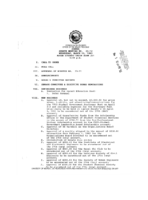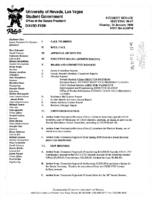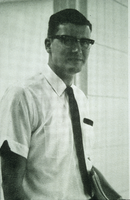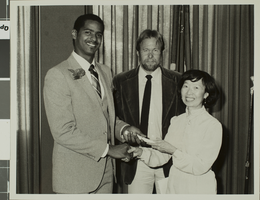Search the Special Collections and Archives Portal
Search Results

Transcript of interview with Sari and Paul Aizley by Claytee D. White, November 4, 2016
Date
Archival Collection
Description
As Sari and Paul Aizley recall their separate childhoods and journeys to Las Vegas, their work and volunteer histories, their efforts to build a better society, and their life together they speak to each other as much as they respond to questions about their observations on the growth of the Las Vegas urban environment and their contributions to Southern Nevada's cultural development and a just society. In this interview, Sari and Paul speak to the cross-town commute and the physical UNLV campus in the late 1960s; the growth of the UNLV Math Department; the evolution of UNLV's Continuing Education; the State's North-South funding rivalry as reflected in the built environments of University of Nevada in Las Vegas and in Reno; plans to build a paleontology research facility at Tule Springs National Monument; the Review-Journal's "Ask Jessie Emmet" Real Estate column; local ACLU offices and politics; Fair Housing; transgendered persons; the Nevada State Assembly, and Class! magazine for Clark County high school students. Sari and Paul smile at each other as they recall how the editor/publisher met the bearded math professor and fell in love—despite the fact that they tell slightly different versions of their initial meeting(s). Sari passed away November 1, 2017, three days shy of one year after she participated in this interview.
Text
Micheal Reese oral history interview
Identifier
Abstract
Oral history interview with Micheal Reese conducted by Helen Nader on February 27, 1979 for the Ralph Roske Oral History Project on Early Las Vegas. In this interview, Reese discusses his career as a teacher and how the school system has changed in Las Vegas, Nevada over time.
Archival Collection

Transcript of interview with Harvey N. Dondero by Elizabeth N. Patrick, August 9, 1984
Date
Archival Collection
Description
Text
Aldeane Ries oral history interview
Identifier
Abstract
Oral history interview with Aldeane Ries conducted by Jennifer Meskimen on April 21, 2002 for the Public School Principalship Oral History Project. In this interview, Ries reflects upon her nearly 40-year career as a teacher and administrator with Nevada’s Clark County School District. She discusses the process by which she became an administrator, her approach to school administration, and her regular job responsibilities as principal. She describes changes within the school district over her 40-year career, cultural diversity among students and staff, and the importance of maintaining relationships with parents and students. She also offers suggestions for individuals interested in pursuing school administration.
Archival Collection

Meeting minutes for Consolidated Student Senate University of Nevada, Las Vegas, March 10, 1993
Date
Archival Collection
Description
Text

Meeting minutes for Consolidated Student Senate, University of Nevada, Las Vegas, January 24, 2000
Date
Archival Collection
Description
Text
University of Nevada, Las Vegas Web Archive
Identifier
Abstract
The University of Nevada, Las Vegas (UNLV) Web Archive represents archived websites that are part of the unlv.edu domain that have been collected since 2013. Websites in this collection represent all academic functions of UNLV including colleges and departments, the University Libraries, museums, undergraduate and graduate colleges, and course catalogs. Other websites represented in this collection include UNLV Athletics, research centers, campus directories, UNLV News Center, and the UNLV President's website.
Archival Collection

Slide of Donald Schmeidel, University of Nevada, Las Vegas, circa 1968
Date
Archival Collection
Description
Image

Photograph of faculty members at the Universtiy of Nevada, Las Vegas, 1983
Date
Archival Collection
Description
Handwritten description provided on back of image: "Lilly Fong Excellence in Teaching 4th Annual Award; Second place presented to: Rudolph Johnson, Physical Education, 1983. L-R: Rudolph Johnson, Dean Richard Kunkel (College of Education), Regent Lilly Fong."
Image

Margie Llorente Gonzales oral history interview: transcript
Date
Archival Collection
Description
Oral history interview with Marietta "Margie" Llorente Gonzales conducted by Cecilia Winchell, Vanessa Concepcion, and Stefani Evans on November 1 and 22, 2021 for Reflections: The Las Vegas Asian American and Pacific Islander Oral History Project. Margie Llorente-Gonzales discusses her upbringing in Manila, the Philippines and her family history within the country, recalling the lives of her parents, grandparents, and great grandparents. She talks about her childhood, educational pursuits, and courtship with her husband in the Philippines. Margie shares how she and her husband immigrated to the United States, how she adapted to her new life as an immigrant dependent on her extended family, and how she and her husband came to settle in Las Vegas. She talks about her artistic pursuits in the forms of dance choreography and performing, scriptwriting, broadcasting, and publishing newsletters. Margie also discusses her employment at McCarran Airport and her political activism, canvassing, and committee work in the Philippines and the United States.
Text
